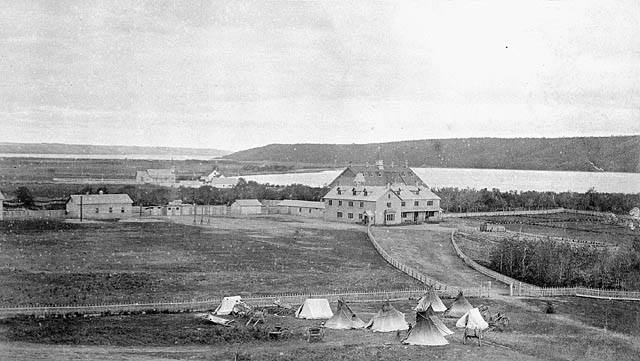(Photo of the Lebret residential school)
WARNING: Disturbing content
By: Marc Lalonde, Local Journalism Initiative Reporter
The federal government announced last week it had come to a settlement agreement in the Federal Indian Boarding Homes (Percival) class-action lawsuit.
The suit was launched on behalf of the approximately 40,000 Indigenous children that were part of boarding home placements with private families for the purpose of attending school between approximately 1951 to 1992. Many of the children placed in these boarding homes suffered physical, sexual, and other abuses and were robbed of their culture and heritage.
A significant number of these placements were overseen by the federal government until control of the program delivery was passed on to Indigenous communities, the government said.
The $50-million settlement will provide individual compensation to individual class members for having been placed in a boarding home and compensation for incidents of physical and sexual or other abuse, and to support commemoration, healing, language and culture.
“I was taken from my family and community in 1968 when I was 13 years old. The impact on me, and on other kids like me, was devastating,” said Court-appointed plaintiff Reginald Percival. “I have spent decades since then, working to heal, to help others, and to explain to the broader community what happened. It has been a long journey but I am gratified by the steps we are now taking, as a country, to acknowledge past wrongs and to move forward together.”
The Indian Boarding Home Program was a program in which the federal government placed children from First Nations communities and Inuit villages in other communities (usually non-Indigenous) to stay with private families for their education.
A Quebec-appointed representative for the Quebec subclass of the lawsuit said he was moved from one colonial institution to another as a youngster.
“I was in a boarding home after I was in Indian Residential School,” said Kenneth Weistche. “This has always been a missing part of the process. It is like a cut with a bandage, but half the cut is not covered, and that half is the boarding home experience. We never dealt with the whole experience. I am really pleased that we reached this agreement.”
The government agreed, saying it was determined to listen to those who endured the horrors of the country’s colonial policies.
“We are determined to heed the words of survivors who suffered abuse while residing in boarding homes for which the Government of Canada was responsible,” said Crown-Indigenous Relations minister Marc Miller. “To truly advance reconciliation, we must work, as we have in this case, to address the cultural loss and abuse experienced in these institutions.”
Support is available for those affected by their experience at Indian Residential Schools and in reading difficult stories related to residential school. The Indian Residential School Crisis Line offers emotional and referral services 24 hours a day at 1-866-925-4419. In Saskatchewan, the Regina Treaty Status Indian Services at 306-522-7494.
